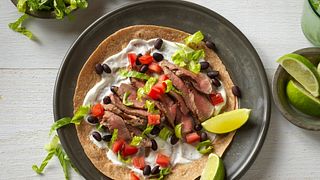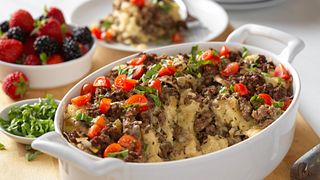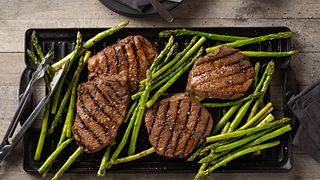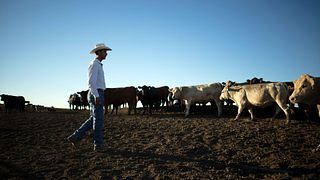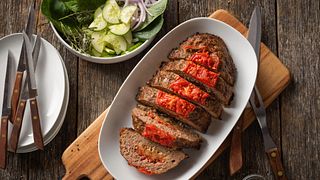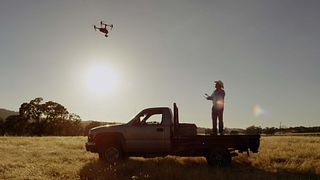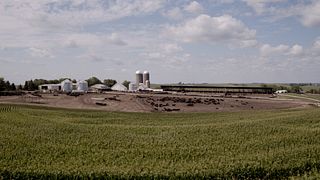MBA Closes the Information Gap Between Beef and Consumers
Ryan Goodman | August 27, 2019
Bringing Pasture and Plate Closer Together
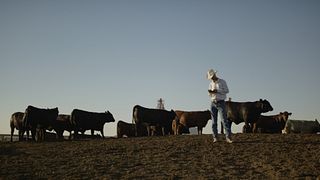
Many consumers today have an increasing interest in beef they eat and how cattle are raised. Market research tells us that consumers trust cattle producers, even if they don’t know exactly what they do or why they do it.
The Masters of Beef Advocacy (MBA) program from the National Cattlemen’s Beef Association, a contractor to the Beef Checkoff, was created 10 years ago to help close the gap between pasture and plate by engaging beef industry advocates and equipping them to effectively communicate with consumers. The program recently achieved a milestone of 15,000 graduates, making it one of the strongest beef advocacy efforts in the industry. Each year, advocates reach tens of millions of consumers as a result of their advocacy efforts.
“Participation in the MBA program is open to anyone,” says Ryan Goodman, director of grassroots advocacy and spokesperson development for the National Cattlemen’s Beef Association, a contractor to the Beef Checkoff. “This includes everyone from those working in the beef industry to consumers interested in helping others learn more about beef and how cattle are raised.”
“A more complete knowledge of beef and where it comes from is a benefit to the entire beef chain, from pasture to plate,” adds Laurie Munns, a cattle producer from Hansel Valley, Utah, and chairman of the Federation of State Beef Councils, a division of NCBA. “Helping convey that information to others in a consistent, confident manner adds to the value we deliver to beef consumers.”
To become an MBA graduate, a series of online lessons must be completed. Those lessons explore the beef lifecycle and answer questions consumers commonly ask about beef production. Advocates then continue to engage with the program through monthly advocacy newsletters and an exclusive Facebook community where updates are provided on the latest consumer trends and beef research.
For cattle producers it has been a highly rewarding experience. “It’s a way to be part of the solution – to get our story out,” says Joan Ruskamp, an MBA graduate who, with her husband Steve, owns a farm/cattle feedlot in Nebraska. “We are using science to validate that cattle are good for the environment, and beef is good for the diet.”
Ruskamp, who served as chairman of the Cattlemen’s Beef Board in 2018, says the MBA program is giving producers and others who support the beef industry – including chefs, retailers, processors and others – terrific elements of support. “It’s not as if we’re expecting them to do this on their own without any training,” she says.
Furthermore, she says, the broad nature of the program encourages individuals at every stage of the beef production chain to get involved. “It features much more inclusiveness and increases understanding of all elements of getting beef to the table,” she says. “It is really about lifting all boats.”
“My life experience has been as a producer on a farm,” says Ruskamp. “The MBA program has provided me with the resources I need to communicate about that, focusing on the message and being succinct. It helps me stay positive, and on topic, and provides me the tools and techniques to be successful. And it lets me practice them.”
“It helps provide all of the important information about how beef gets from pasture to plate,” says Dawn Caldwell, who with her husband Matt, owns a commercial cow-calf operation based in Edgar, Neb. “It teaches us how to reach more people, to interact with them effectively, whether it’s writing powerful opinion pieces, making personal contacts with consumers or other ways of reaching out. It provides the basics of what we need to tell our story.”
MBA graduate Debbie Lyons-Blythe, who with her husband Duane, operates Blythe Family Farms LLC in the Flint Hills of Kansas, started a blog of her own about a decade ago to reach food professionals. She was one of the first to get involved in the MBA program. Lyons-Blythe says the MBA program benefits everyone.
“The MBA program has opened many doors for me,” she says. “And it has done a spectacular job by empowering more people to step out of their comfort bubble,” she says.
Lyons-Blythe says the MBA program is about more than just the tools and techniques it provides. “The MBA program has enhanced peoples’ opinions of advocates,” she says. “We’re not just spending time on Facebook, we’re answering questions, we’re connecting with important audiences. It is providing credibility to our messages.”
In this way, consumers get to know the industry on a more personal level. “People want to know the individual who does the work,” says Lyons-Blythe. “The goal is to be honest, to be open – to begin discussions to show that we’re people just like them.”
Caldwell, who was 2018 chair of the Federation of State Beef Councils, agrees the credibility issue is important to consumers. “It helps provide authenticity for information they’re getting,” she says. “They get a true, honest answer from us. And we learn how to be better communicators, explaining what we do more effectively.”
Ruskamp also agrees. “Communicating allows people outside of our industry to meet us,” she says. “I’m a real person sharing that story, not a machine. They sometimes forget there are people involved. With the help of MBA, we can help make it personal.”
She says her own goal is to make the communication with her audiences as easy and natural as possible. “I don’t want food to be a stressor,” says Ruskamp. “If we can build a positive connection – that it’s about us and them together – we can reduce the consumer’s stress around food.”
Answering Critical Questions
Answering questions is one thing; responding to critical questions in a manner that leads to positive conversations with consumers can sometimes be more difficult. Graduates who have reached out to consumers recognize there are individuals who don’t necessarily want to become engaged in discussions.
“There are people out there who have their own agenda,” says Ruskamp. “Some don’t want us doing what we do. But as long as I keep going back to my story – that we care for our animals and have pride in the work we do – and we connect with people about our values, we’ll be successful.”
Ruskamp experienced that directly several years ago when she was on a Food for the Future panel in New York. “I was definitely in an antagonistic environment for meat and modern agriculture,” she says. “Initially I was shunned by many people. But I had help from the Beef Checkoff and NCBA and MBA staffers, who provided me support and information. I learned that if you stay with the person in the discussion, and not focus solely on the problem, you can have an impact.
“The second morning of the panel the topic turned to antibiotics. I made the case that we as producers care about this issue and want to use antibiotics for the right reasons. I stressed that we all have the same goals and values. The conversation started to shift. I had people coming up to me after the panel to continue the discussion.”
Lyons-Blythe says not everyone will be open to the industry’s message. “But it’s the ones watching the back-and-forth that I’m trying to reach. When you make that one positive connection, you’ve been successful,” she says. “You are enhancing trust and showing that we all want good, safe food.”
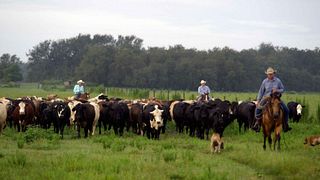
The More the Merrier
Reaching 15,000 MBA graduates “is an impressive number,” says Caldwell, but it shouldn’t be the last word. “My wish would be that every one of the 800,000 beef producers in this country would be an MBA graduate,” she says. “Sure, it can be scary to put yourself out there. We’re certainly more comfortable on our farm or ranch. But the more producers that have these skills the better off we all are.”
“We’re outnumbered,” says Ruskamp. “Every person who has cattle is charged with telling the story and should get involved to tell it.”
She goes on to say that there is strength in numbers. “It takes every single voice,” says Ruskamp. “You don’t know when that one additional voice will have an impact. Everyone has something to offer.”
Lyons-Blythe says the 15,000 MBA graduates are making a difference, but if everyone got involved it would give the program a boost. “It’s up to every single one of us,” she says. “Yes, it’s the tools, the confidence, the information. But it’s also a mindset.”
Caldwell says MBA is one of the programs that can bring the industry together. “Regardless of the segment of the industry you’re in, or which organizations you belong to, MBA is absolutely for everyone,” she says. “In fact, MBA and the Beef Quality Assurance program are at the core of our industry working together. Thank goodness for the Beef Checkoff that funds these kinds of programs.”
Today, as an extension of the program, NCBA, a contractor to the Beef Checkoff, also partners with State Beef Councils to host training workshops that offer graduates more in-depth training, tactical communication skills and provide greater confidence to successfully engage with consumers, both in person and online. More than 70 of these workshops and presentations, reaching more than 3,000 beef advocates, were completed in 2018. More information on the program can be found on the Masters of Beef Advocacy page.
About the Beef Checkoff
The Beef Checkoff Program was established as part of the 1985 Farm Bill. The checkoff assesses $1 per head on the sale of live domestic and imported cattle, in addition to a comparable assessment on imported beef and beef products. States may retain up to 50 cents on the dollar and forward the other 50 cents per head to the Cattlemen's Beef Promotion and Research Board, which administers the national checkoff program, subject to USDA approval.
About NCBA, a Contractor to the Beef Checkoff
The National Cattlemen’s Beef Association (NCBA) is a contractor to the Beef Checkoff Program. The Beef Checkoff Program is administered by the Cattlemen’s Beef Board, with oversight provided by the U.S. Department of Agriculture.
